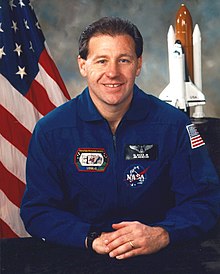Albert Sacco Jr.
| Albert Sacco, Jr. | |
|---|---|
 |
|
| WPI Payload Specialist | |
| Nationality | American |
| Born |
May 3, 1949 (age 67) Boston, Massachusetts |
|
Other occupation
|
Professor |
|
Time in space
|
15d 21h 34m |
| Missions | STS-73 |
|
Mission insignia
|
|
Albert Sacco, Jr. (born May 3, 1949) is an American chemical engineer who flew as a Payload Specialist on the Space Shuttle Columbia on shuttle mission STS-73 in 1995.
Born in Belmont, Massachusetts, Sacco completed a bachelor's degree in chemical engineering from Northeastern University in Boston in 1973, and then a Ph.D. in chemical engineering from the Massachusetts Institute of Technology in 1977. He then joined the faculty of the Worcester Polytechnic Institute, becoming a full professor and rising to department head in 1989.
Sacco accepted the position of Dean of the Edward E. Whitacre Jr. College of Engineering at Texas Tech University, effective January 1, 2011.
Sacco flew as a payload specialist on STS-73, which launched on October 20, 1995, and landed at the Kennedy Space Center on November 5, 1995.
In November, 1971, Sacco married Teran Lee Gardner (Mertz) and they divorced in 2006. They have 4 children. Some of Albert Sacco's hobbies include jogging, reading, and walking. Sacco loves scuba diving and is a certified scuba instructor as well. His parents are deceased. Albert Sacco is extremely involved in different organizations. Dr. Sacco is a member of the American Institute of Chemical Engineers, past president of the New England Catalysis Society, and the New England representative to the North American Catalysis Society. He is also an Advisory Board member of the American Carbon Society and a member of the American Institute of Aeronautics and Astronautics (AIAA). Dr. Sacco is on the AIAA Technical Committee on Space Processing. Lastly, he is also a member of the Association of Space Explorers-USA. Albert Sacco has more than 70 publications. These publications address areas such as carbon filament initiation and growth, catalyst deactivation, and zeolite synthesis. Dr. Sacco has been honored with many awards throughout his life so far. In 1984 he received an award by the Worcester Engineering Society, receiving the Admiral Earl Award for contributions in applied sciences, more specifically in the fields of catalysis and adsorbent deactivation. He also received a National Science Foundation Young Faculty Initiation Grant; and won the Northeast AIChE student paper contest in. Dr. Sacco's space mission was flying as a payload specialist on STS-73, which launched on October 20, 1995. It landed at the Kennedy Space Center on November 5, 1995. The mission took place over a span of 16 days. It focused on materials science, biotechnology, combustion science, and fluid physics contained within the pressurized Spacelab module. Albert Sacco has divided his time between teaching and research. He is most known for his scientific contributions. He ran a family restaurant with his father and brother for over 20 years in Boston. Currently, Albert Sacco's research is investigating the production of quantum wires using titanosilicates. He is also investigating using bacteria and yeast for trace gas detection by mixing these living systems with high performing semiconductors.His hypothesis is that these systems will self repair while carrying out a task. The technique used for his is called multifunctional materials, which are materials that can start on contact with an electrical circuit. This in turn will produce radicals to destroy harmful contaminates. This will be used in close food production and close loop live support systems on submarines and spacecrafts. On top of that, Dr. Sacco is in the process of developing a new method of photo catalysis that will help kill harmful bacteria and fungus in the production of food. Sacco is also involved in the production of compound membranes for use in fuel cells for cars. He has consulted for a plethora of companies in fields such as catalysis, solid/gas contacting, and equipment design for space equipment.
...
Wikipedia
